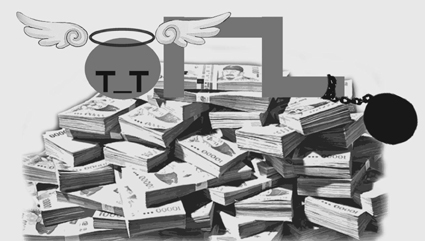One university student’s case is typical. To pay tuition, he took out a government loan, but to pay back the mounting interest, he took out another loan, this one from a private moneylender. As collateral for 400,000 won, the lender asked the student to open four cell phone accounts and turn over the phones. After a month, the student received four phone bills for a total of 10,000,000 won. The moneylender had also used the student’s phones for voice phishing, so the student was arrested, since the phones were under his name.
According to a 2007 report by the Korea Institute of Finance, university students constitute four percent of borrowers from private moneylenders. The main two reasons for borrowing money are to pay the high tuition fees and to spend money for an emergency. “More university students have requested to consult with us about their problems with private moneylenders than in the past,” said Song Tae-kyung, the head of a civic group named Minsaeng Yondae.
The basic problem of the private money market is simple: the interest rates are usually set illegally high, from 100 to 3,000 percent, depending on moneylender. This is higher than the legal interest rate of private money-lending system set by the government which is 49 percent. If people do not pay back the money with the high interest, some private moneylenders also force students into breaking the law. “Some students who cannot pay back their high interest sell their organs, and some go into prostitution,” said Kim Dong-un, who works for the civic group People Power 21.
Students can easily step into different traps set by the moneylenders. “One way that many university students get fooled is that they believe there is nothing wrong with opening new cell phones for the moneylenders,” said Song. The lenders then sell these cell phones to other people. What the borrower gets a month later are several phone bills with preposterous fees. “This September, a student living in Jeolla Province committed suicide because he was both shocked and worried about paying back the high mobile phone bills created by private moneylenders,” said Song.
Borrowing money from a private moneylender creates a vicious cycle for university students. “Most university students do not know how dangerous it is. Since they tend to lack social and financial knowledge, it is easy for private moneylenders to fool them,” said Song.
“Once students start borrowing from private moneylenders, they cannot use ordinary financial institutions due to their low credit ratings. This lack of access to banking leads them to keep asking for more loans from private moneylenders. Ultimately the students go bankrupt,” said Kim.
Solutions vary. “Government policies should be changed in order to eradicate the vicious cycle of private money-lending. Downward readjustment of interest rates may allow people to avoid borrowing money from a private moneylender,” said Kim. Kim also said that the surveillance network should be strengthened so that illegal private money lenders are exterminated.
Currently, Congressman Choi Chul-kuk has introduced a bill strengthening regulations for private moneylenders and ways to protect and relieve people who are suffering from the vicious cycle of private moneylending. “The bill includes sub-points such as designating a relief organization to deal with the problems of borrowers and asking local governments to file reports of actual conditions in the region’s private money market,” said Choi’s secretary.
Lee added that increasing the governmental budget for education and lowering the interest rate of loans for tuition fees can also be solutions to eradicate illegal borrowing from the private money market. 

